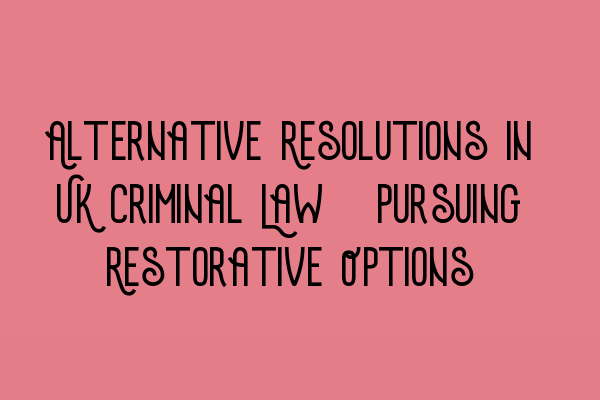Alternative Resolutions in UK Criminal Law: Pursuing Restorative Options
In the field of criminal law in the UK, alternative resolutions have gained significant attention as a means of pursuing justice in a more restorative manner. This approach, which seeks to repair harm and address the needs of all parties involved, has shown promising results in reducing reoffending rates and improving community relationships.
The Importance of Restorative Justice
Restorative justice places a strong emphasis on accountability, empathy, and dialogue between the offender, victim, and the community. By encouraging open communication, it allows all parties to have a voice and actively participate in the resolution process. This approach focuses on repairing the harm caused by the offense, rather than solely punishing the offender.
Types of Alternative Resolutions
There are several alternative resolutions available within the UK criminal justice system that promote restorative justice principles. These include:
1. Restorative Justice Conferencing
Restorative justice conferencing involves bringing together the offender, victim, and any other relevant individuals to discuss the impact of the offense and reach an agreement on how the harm can be repaired. This process allows for direct communication and the opportunity for the offender to take responsibility for their actions.
2. Community Resolution
Community resolution provides an opportunity for low-level offenses to be resolved within the local community, rather than going through formal court proceedings. It offers a chance for the offender to make amends by undertaking activities that benefit the community, such as apologizing, repairing damage, or engaging in restorative programs.
3. Diversionary Programs
Diversionary programs aim to divert individuals away from the criminal justice system and provide them with rehabilitative support instead. These programs, such as drug and alcohol rehabilitation schemes or anger management courses, address the underlying causes of offending behavior and help individuals reintegrate into society.
Benefits of Pursuing Restorative Options
By choosing restorative options in criminal law cases, both the offender and the victim can experience several benefits:
- Greater satisfaction: Restorative justice processes often lead to higher satisfaction levels for both offenders and victims compared to traditional court processes.
- Reduced reoffending rates: Research has shown that restorative justice approaches lead to lower reoffending rates, indicating the effectiveness in promoting rehabilitation and preventing future crimes.
- Healing and closure: Victims often report a sense of closure and healing as they have the opportunity to express their feelings, receive an apology, and actively participate in the resolution process.
- Community engagement: Restorative justice fosters strong community relationships by involving local stakeholders in resolving conflicts, promoting a sense of accountability and responsibility within the community.
Conclusion
Alternative resolutions in UK criminal law, with a focus on restorative options, offer an innovative and effective approach to addressing offenses. By integrating principles of restorative justice, such as accountability, empathy, and dialogue, these resolutions provide opportunities for healing, rehabilitation, and community engagement.
If you are interested in learning more about criminal law, preparing for the SQE 1 Practice Exam Questions or SQE 1 Practice Mocks FLK1 FLK2, or looking for SQE 2 Preparation Courses or SQE 1 Preparation Courses, please visit our website. Stay updated with the latest SRA SQE Exam Dates and enhance your knowledge in the field of criminal law.
